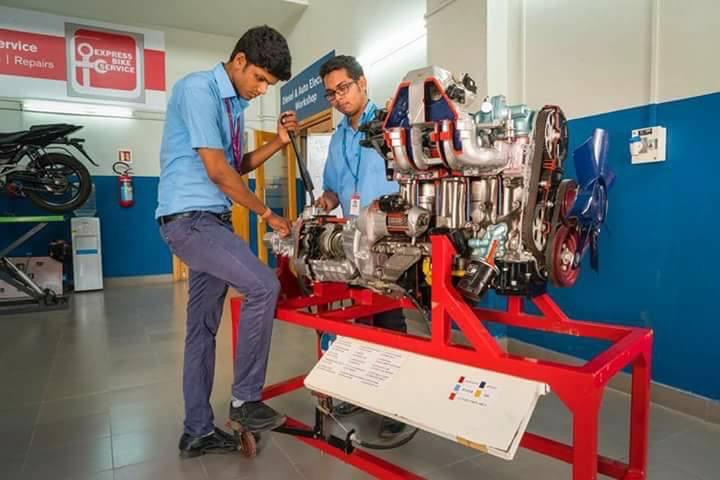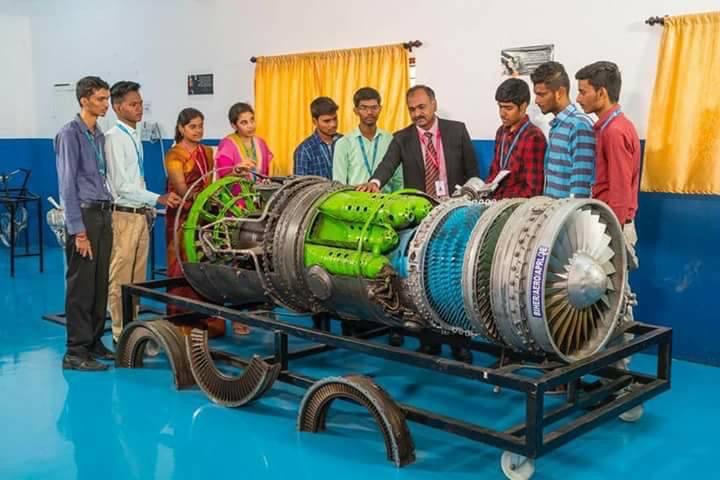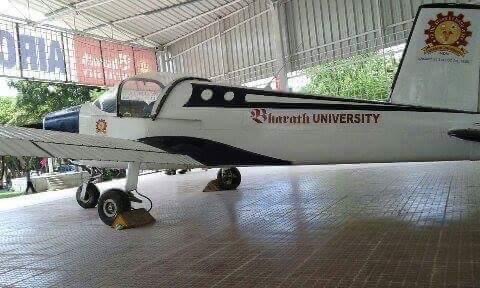Welcome to Aeronautical Engineering
About The School :
Twenty first century is poised to become a century of space explorations and manned missions to other planets. It will be a time of space stations and robotic probes. The world will continue to need aerospace scientists, engineers, technologists and technicians to accomplish these highly exciting and challenging missions. Keeping this in mind the Department of Aeronautical Engineering was started in Bharath University in the year 2012.
The Aeronautical Engineering students are encouraged to actively involve in research projects and come out with innovative ideas. With constant support extended by the Management, the basic infra-structure needed for regular curricular programs as well as for fundamental and applied research is being established in the Department.
The Department provides a conducive academic environment for both students and faculty to bring out the best outcome from them.
Vision & Mission
Our Vision :
Department of Aeronautical Engineering will endeavour to accomplish worldwide recognition with a focal point of Excellence in the field of Aeronautics by providing quality Education through world class facilities, enabling graduates turning out to be Professional Experts with specific knowledge in Aeronautical & Aerospace engineering.
Our Mission :
Mission of the department is to achieve International Recognition by:
- MD 1 - To be the state of art Teaching and Learning centre with excellent infrastructure and empowered Faculties in Aeronautical & Aerospace Engineering.
- MD 2 - To foster a culture of innovation among students in the field of Aeronautics and Aerospace with updated professional skills to enhance research potential for sponsored research and innovative projects.
- MD 3 - To Nurture young individuals to be knowledgeable, skilful, and ethical professionals in their pursuit of Aeronautical Engineering.
Deans Desk :
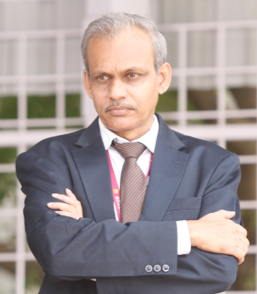
Aeronautical Engineering is a fascinating and high-technology discipline more than 100 years old, still requiring much more contribution by engineers and scientists to broaden its scope and application to develop next generation aircrafts. Aeronautical engineering is an ever developing discipline full of exciting opportunities and challenges with several private players entering the aeronautical industry, the opportunities are going to be better and better. Job opportunities for an Aeronautical Engineer in India lies with government owned air service, aircraft manufacturers and research centres.
Many of the Aeronautical Engineers get better placement opportunities in the private and public manufacturing sectors and contribute well for the development of the efficient products. The Faculty and students of our department are engaged in acquiring cutting edge technology and the excellent infrastructural facilities available in the department allowing them to delve into pushing the boundaries of the state of the art of technology.
Aeronautical department boasts of dedicated faculty who are committed in providing highest quality students in today's professional workforce. Our programs complement not only the student learning experience, but also business, government and industry. Through internship, research, and innovation we are committed to challenging, mentoring and providing an exceptional learning experience for our students. I look forward for developing and implementing strategic initiatives which will further enhance the professional education of all our students. BIHER has a strong tradition of integrity, diversity, access, responsibility and excellence. I fully support this initiative of bringing out this souvenir, which is the resultant output of the unwavering dedication of all who had worked for it. My best wishes and greetings to all the students who are aspiring to become Aeronautical Engineers and take India to the forefront of developed nations.
Value Added Courses
VAC - (2016 - 2017) :
| S.No | Value Added Courses | Number of Student Enrolled | Event Date | Event Detail |
|---|---|---|---|---|
| Click Here | ||||
| Click Here | ||||
| Click Here | ||||
| Click Here |
Value Added Courses
VAC - (2015 - 2016) :
| S.No | Value Added Courses | Number of Student Enrolled | Event Date | Event Detail |
|---|---|---|---|---|
| Click Here | ||||
| Click Here | ||||
| Click Here |
Events
Seminar - (2015 - 2016) :
| S. NO | Title | Number of Participants | Date | Event Detail |
| 01 | Seminar on Aeroplane Propulsion System | 57 | 02.03.2016 | Click Here |
| 02 | Seminar on Space Shuttles And Its Advancements | 51 | 05.04.2016 | Click Here |
| 03 | Seminar on Low Cost Spacecraft Simulator | 55 | 08.05.2016 | Click Here |
Events
Seminar - (2016 - 2017) :
| S.No | Title | Number of Participants | Date | Event Detail |
|---|---|---|---|---|
| Click Here | ||||
| Click Here | ||||
| Click Here | ||||
| Click Here | ||||
| Click Here |
Events
Seminar - (2017 - 2018) :
| S.No | Title | Number of Participants | Date | Event Detail |
|---|---|---|---|---|
| Click Here | ||||
| Click Here | ||||
| Click Here | ||||
| Click Here | ||||
| Click Here | ||||
| Click Here | ||||
| Click Here | ||||
| Click Here |
Events
Seminar - (2018 - 2019) :
| S.No | Particulars | Event | Event Detail | |
|---|---|---|---|---|
| Click Here |
Events
Seminar - (2019 - 2020) :
| S.No | Particulars | Event | Event Detail |
|---|---|---|---|
| Click Here | |||
| Click Here | |||
| Click Here | |||
| Click Here | |||
| Click Here | |||
| Click Here | |||
| Click Here | |||
| Click Here | |||
| Click Here | |||
| Click Here | |||
| Click Here | |||
| Click Here | |||
| Click Here | |||
| Click Here | |||
| Click Here |
Events
Seminar - (2020 - 2021) :
Events
Conference - (2016 - 2017) :
| S.No | Particulars | Event | Event Detail |
|---|---|---|---|
| Click Here | |||
| Click Here |
Events
Conference - (2017 - 2018) :
| S.No | Particulars | Event | Event Detail |
|---|---|---|---|
| Click Here | |||
| Click Here |
Events
Conference - (2018 - 2019) :
| S.No | Particulars | Event | Event Detail |
|---|---|---|---|
| Click Here | |||
| Click Here | |||
| Click Here |
Events
Conference - (2019 - 2020) :
| S.No | Particulars | Event | Event Detail |
|---|---|---|---|
| Click Here | |||
| Click Here | |||
| Click Here |
Events
Conference - (2020 - 2021) :
Events
Workshop - (2016 - 2017) :
| S.No | Particulars | Event | Event Detail |
|---|---|---|---|
| Click Here | |||
| Click Here | |||
| Click Here | |||
| Click Here | |||
| Click Here |
Events
Workshop - (2017 - 2018) :
| S.No | Particulars | Event | Event Detail |
|---|---|---|---|
| Click Here | |||
| Click Here | |||
| Click Here | |||
| Click Here | |||
| Click Here |
Events
Workshop - (2018 - 2019) :
| S.No | Particulars | Event | Event Detail |
|---|---|---|---|
| Click Here | |||
| Click Here | |||
| Click Here | |||
| Click Here | |||
| Click Here |
Events
Workshop - (2019 - 2020) :
| S.No | Particulars | Event | Event Detail |
|---|---|---|---|
| Click Here | |||
| Click Here | |||
| Click Here | |||
| Click Here | |||
| Click Here | |||
| Click Here | |||
| Click Here | |||
| Click Here | |||
| Click Here |
Events
Workshop - (2020 - 2021) :
Value Added Courses
VAC - (2018 - 2019) :
| S.No | Value Added Courses | Number of Student Enrolled | Event Date | Event Detail |
|---|---|---|---|---|
| Click Here | ||||
| Click Here | ||||
| Click Here | ||||
| Click Here |
Value Added Courses
VAC - (2019 - 2020) :
| S.No | Value Added Courses | Number of Student Enrolled | Event Date | Event Detail |
|---|---|---|---|---|
| Click Here | ||||
| Click Here | ||||
| Click Here | ||||
| Click Here | ||||
| Click Here | ||||
| Click Here | ||||
| Click Here | ||||
| Click Here |
Value Added Courses
VAC - (2020 - 2021) :
Value Added Courses
VAC - (2017 - 2018) :
| S.No | Value Added Courses | Number of Student Enrolled | Event Date | Event Detail |
|---|---|---|---|---|
| Click Here | ||||
| Click Here | ||||
| Click Here | ||||
| Click Here | ||||
| Click Here | ||||
| Click Here | ||||
| Click Here |
Seminar Details ( 2017 – 2018) :
| S.No | Event Name | Event Date | Event Detail |
|---|---|---|---|
|
Click Here |
|||
|
Click Here |
|||
|
Click Here |
|||
|
Click Here |
|||
|
Click Here |
|||
|
Click Here |
|||
|
Click Here |
|||
|
Click Here |
Publication
Conference Articles :
| S.No | TITLE OF THE ARTICLE | AUTHORS | ISBN No | View PDF |
|---|---|---|---|---|
Board of Studies
Minutes & Meeting:
2015 - 2016
2016 - 2017
2017 - 2018
2018 - 2019
2019 - 2020
-
PEO1: PREPARATION:
Aeronautical engineering graduates will possess a strong foundation in mathematical, scientific and engineering fundamentals necessary to analyse, formulate and solve engineering problems in the field of aeronautical engineering.
-
PEO2: CORE COMPETENCE:
Aeronautical engineering graduates will have the skills and experience in defining problems in the field of aeronautical engineering for designing, implementing, analysing the experimental evaluations, and finally making appropriate decisions.
-
PEO3: PROFESSIONALISM:
Aeronautical engineering graduates will have enhanced skills and embrace new thrust areas through self-directed professional development and post-graduate training or education.
-
PEO4: SKILL:
Aeronautical engineering graduates will acquire professional skills such as computer aided engineering skills, aero modelling skills and soft skills to be a better professional.
-
PEO5: ETHICS:
Aeronautical engineering graduates will apply the ethical and social aspects of modern engineering and technology innovations to the design, development, and usage of new products, machines, gadgets, devices, etc.
-
PO1: Engineering Knowledge:
Apply the knowledge of mathematics, science, engineering fundamentals, and aeronautical engineering to solve the complex problems in the field of aeronautical engineering.
-
PO2: Problem Analysis:
Identify, formulate, research literature, and analyze engineering problems to arrive at substantiated conclusions using fundamentals of mathematics, physics, and engineering sciences.
-
PO3: Design/development of Solutions:
Design solutions for complex engineering problems and design system components, processes to meet the specifications with consideration for the public health and safety, and the cultural, societal, and environmental considerations.
-
PO4: Conduct Investigations of Complex Problems:
Use research-based knowledge including design of experiments, analysis and interpretation of data, and synthesis of the information to provide valid conclusions.
-
PO5: Modern Tool Usage:
Create, select, and apply appropriate techniques, resources, and modern engineering and software tools including simulation and modeling to complex engineering activities with an understanding of the limitations.
-
PO6: The Engineer and Society:
Apply reasoning informed by the contextual knowledge to assess societal, health, safety, legal and cultural issues and the consequent responsibilities relevant to the professional engineering practice.
-
PO7: Environment and Sustainability:
Understand the impact of the professional engineering solutions in societal and environmental contexts, and demonstrate the knowledge of, and need for sustainable development.
-
PO8: Ethics:
Apply ethical principles and commit to professional ethics and responsibilities and norms of the engineering practice.
-
PO9: Individual and Team Work:
Function effectively as an individual, and as a member or leader in teams, and in multidisciplinary settings.
-
P10: Communication:
Communicate effectively with the engineering community and with society at large. Be able to comprehend and write effective reports. Make effective presentations, and give and receive clear instructions.
-
P11: Project Management and Finance:
Demonstrate knowledge and understanding of engineering and management principles and apply these to one’s own work, as a member and leader in a team. Manage projects in multidisciplinary environments.
-
P12: Life-long learning:
Recognize the need for, and have the preparation and ability to engage in independent and life-long learning in the broadest context of technological change.
-
PSO 1:
Apply Aerodynamic concepts and simulation techniques to design Aerodynamic components and evaluate Aircraft Performance, Stability and Control aspects.
-
PSO 2:
Examine Aircraft Engine components, Compute their performance characteristics for efficient Propulsive Systems and carryout Aero Engine maintenance practices.
-
PSO 3:
Design, Analyze and Fabricate Aircraft structural components using advance materials and perform Airframe maintenance activities.
| Academic Year | Student Admitted |
|---|---|
BIHER
B.Tech - Aerospace Engineering :
- PEOs
- POs
- PSOs
- Curriculum Syllabus
- Student Strength
Programme Educational Objectives – (PEOs)
-
PEO1: PREPARATION:
To provide students with sound fundamental in Mathematical, Scientific and Engineering fundamentals necessary to formulate, analyse, and and also to combine fundamental knowledge of engineering principles with modern techniques to solve realistic, unstructured problems that arise in the field of engineering and non-engineering efficiently and cost effectively.
-
PEO2: CORE COMPETENCE:
To apply critical reasoning, quantitative, qualitative, designing and programming skills, to identify, solve problems and to analyze the experimental evaluations, and finally making appropriate decisions, and to enhance the techniques in problem-solving abilities in professional engineering practice for a wide variety of technical applications, including the design and usage of modern tools for improvement in the field of Electronics and Communication Engineering..
-
PEO3: PROFESSIONALISM:
To broaden knowledge to establish themselves as creative practicing professionals, locally and globally, to pursue life-long learning by successfully participating in post graduate or any other professional program for continuous improvement which is a requisite for a successful engineer to become a leaderin the work force or educational sector
-
PEO4: SKILL:
To provide Industry based training for developing professional skills and soft skills such as proficiency in languages, technical communication, verbal, logical, analytical, comprehension, team building, inter personal relationship, group discussion and leadership skill to become a better professional.
-
PEO5: ETHICS:
To apply the ethical and social aspects of modern Engineering and Technology innovations to the design, development, and usage of new products, systems, gadgets, devices, etc
Programme Outcomes – (POs)
-
PO 1: Engineering Knowledge:
Apply the knowledge of mathematics, science, engineering fundamentals, and engineering specialization to the solution of complex engineering problems.
-
PO 2: Problem Analysis:
Identify, formulates, research literature, and analyze engineering problems to arrive at substantiated conclusions using first principles of mathematics, natural, and engineering sciences.
-
PO 3: Design/development of Solutions:
Design solutions for complex engineering problems and design system components, processes to meet the specifications with consideration for the public health and safety, and the cultural, societal, and environmental considerations.
-
PO 4: Conduct Investigations of Complex Problems:
Use research-based knowledge including design of experiments, analysis and interpretation of data, and synthesis of the information to provide valid conclusions.
-
PO 5: Modern Tool Usage:
Create, select, and apply appropriate techniques, resources, and modern engineering and IT tools including prediction and modeling to complex engineering activities with an understanding of the limitations. .
-
PO 6: The Engineer and Society:
Apply reasoning informed by the contextual knowledge to assess societal, health, safety, legal, and cultural issues and the consequent responsibilities relevant to the professional engineering practice.
-
PO 7: Environment and Sustainability:
Understand the impact of the professional engineering solutions in societal and environmental contexts, and demonstrate the knowledge of, and need for sustainable development.
-
PO 8: Ethics:
Apply ethical principles and commit to professional ethics and responsibilities and norms of the engineering practice.
-
PO 9: Individual and Team Work:
Function effectively as an individual, and as a member or leader in teams, and in multidisciplinary settings.
-
PO 10: Communication:
Communicate effectively with the engineering community and with society at large. Be able to comprehend and write effective reports documentation. Make effective presentations, and give and receive clear instructions.
-
PO 11: Project Management and Finance:
Demonstrate knowledge and understanding of engineering and management principles and apply these to one’s own work, as a member and leader in a team. Manage projects in multidisciplinary environments.
-
PO 12: Life-long learning:
Recognize the need for, and have the preparation and ability to engage in independent and life-long learning in the broadest context of technological change and engineering practice.
Programme Specific Outcomes – (PSOs)
-
PSO 1:
Apply Aerodynamic concepts and simulation techniques to design Aerodynamic components and evaluate Aircraft Performance, Stability and Control aspects.
-
PSO 2:
Examine Aircraft Engine components, Compute their performance characteristics for efficient Propulsive Systems and carryout Aero Engine maintenance practices.
-
PSO 3:
Design, Analyze and Fabricate Aircraft structural components using advance materials and perform Airframe maintenance activities.
Curriculum Syllabus
Student Strength
| Academic Year | Student Admitted |
|---|---|
BIHER
B.Tech - Aeronautical Engineering :
- PEOs
- POs
- PSOs
- Curriculum Syllabus
- Student Strength
Programme Educational Objectives – (PEOs)
-
PEO1: PREPARATION:
To provide students with sound fundamental in Mathematical, Scientific and Engineering fundamentals necessary to formulate, analyse, and and also to combine fundamental knowledge of engineering principles with modern techniques to solve realistic, unstructured problems that arise in the field of engineering and non-engineering efficiently and cost effectively.
-
PEO2: CORE COMPETENCE:
To apply critical reasoning, quantitative, qualitative, designing and programming skills, to identify, solve problems and to analyze the experimental evaluations, and finally making appropriate decisions, and to enhance the techniques in problem-solving abilities in professional engineering practice for a wide variety of technical applications, including the design and usage of modern tools for improvement in the field of Electronics and Communication Engineering..
-
PEO3: PROFESSIONALISM:
To broaden knowledge to establish themselves as creative practicing professionals, locally and globally, to pursue life-long learning by successfully participating in post graduate or any other professional program for continuous improvement which is a requisite for a successful engineer to become a leaderin the work force or educational sector
-
PEO4: SKILL:
To provide Industry based training for developing professional skills and soft skills such as proficiency in languages, technical communication, verbal, logical, analytical, comprehension, team building, inter personal relationship, group discussion and leadership skill to become a better professional.
-
PEO5: ETHICS:
To apply the ethical and social aspects of modern Engineering and Technology innovations to the design, development, and usage of new products, systems, gadgets, devices, etc
Programme Outcomes – (POs)
-
PO 1: Engineering Knowledge:
Apply the knowledge of mathematics, science, engineering fundamentals, and engineering specialization to the solution of complex engineering problems.
-
PO 2: Problem Analysis:
Identify, formulates, research literature, and analyze engineering problems to arrive at substantiated conclusions using first principles of mathematics, natural, and engineering sciences.
-
PO 3: Design/development of Solutions:
Design solutions for complex engineering problems and design system components, processes to meet the specifications with consideration for the public health and safety, and the cultural, societal, and environmental considerations.
-
PO 4: Conduct Investigations of Complex Problems:
Use research-based knowledge including design of experiments, analysis and interpretation of data, and synthesis of the information to provide valid conclusions.
-
PO 5: Modern Tool Usage:
Create, select, and apply appropriate techniques, resources, and modern engineering and IT tools including prediction and modeling to complex engineering activities with an understanding of the limitations. .
-
PO 6: The Engineer and Society:
Apply reasoning informed by the contextual knowledge to assess societal, health, safety, legal, and cultural issues and the consequent responsibilities relevant to the professional engineering practice.
-
PO 7: Environment and Sustainability:
Understand the impact of the professional engineering solutions in societal and environmental contexts, and demonstrate the knowledge of, and need for sustainable development.
-
PO 8: Ethics:
Apply ethical principles and commit to professional ethics and responsibilities and norms of the engineering practice.
-
PO 9: Individual and Team Work:
Function effectively as an individual, and as a member or leader in teams, and in multidisciplinary settings.
-
PO 10: Communication:
Communicate effectively with the engineering community and with society at large. Be able to comprehend and write effective reports documentation. Make effective presentations, and give and receive clear instructions.
-
PO 11: Project Management and Finance:
Demonstrate knowledge and understanding of engineering and management principles and apply these to one’s own work, as a member and leader in a team. Manage projects in multidisciplinary environments.
-
PO 12: Life-long learning:
Recognize the need for, and have the preparation and ability to engage in independent and life-long learning in the broadest context of technological change and engineering practice.
Programme Specific Outcomes – (PSOs)
-
PSO 1:
Apply Aerodynamic concepts and simulation techniques to design Aerodynamic components and evaluate Aircraft Performance, Stability and Control aspects.
-
PSO 2:
Examine Aircraft Engine components, Compute their performance characteristics for efficient Propulsive Systems and carryout Aero Engine maintenance practices.
-
PSO 3:
Design, Analyze and Fabricate Aircraft structural components using advance materials and perform Airframe maintenance activities.
Curriculum Syllabus
Student Strength
| Academic Year | Student Admitted |
|---|---|
Faculty
Visiting / Adjunct :
Board of Studies
Members of BOS ( June 2024 – May 2025 ) :
| S.No | Name | Designation | Core Competency |
|---|---|---|---|
|
|||
|
|||
|
|||
|
|||
|
|||
|
|||
|
|||
|
|||
|
|||
|
|||
|
|||
Faculty Profile
Full - Time :
| S.No | Name | Designation | CV |
|---|---|---|---|
|
|
||
|
|
||
|
|
||
|
|
||
|
|
||
|
|
||
|
|
||
|
|
||
|
|
||
|
|
||
|
|
||
|
|
||
|
|
||
|
|
||
|
|
||
|
|
||
|
|
||
|
|
||
|
|
||
|
|
||
|
|
||
|
|
